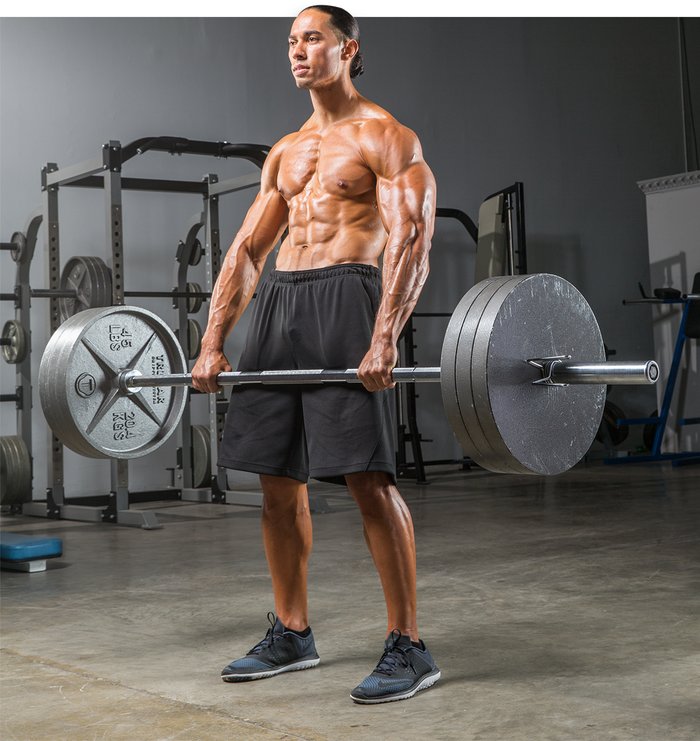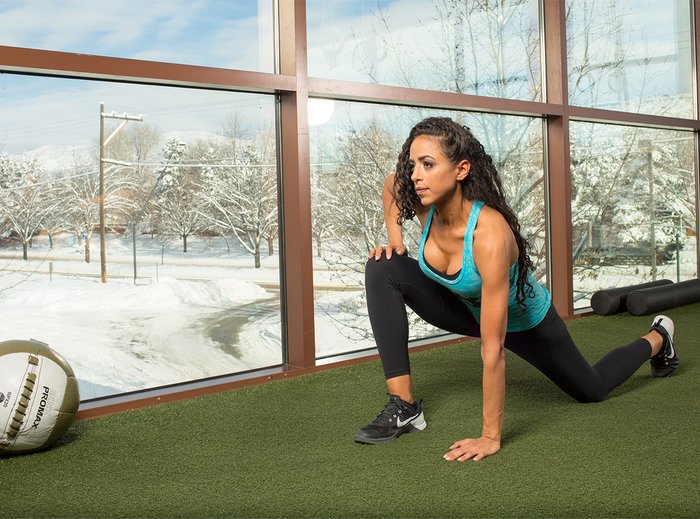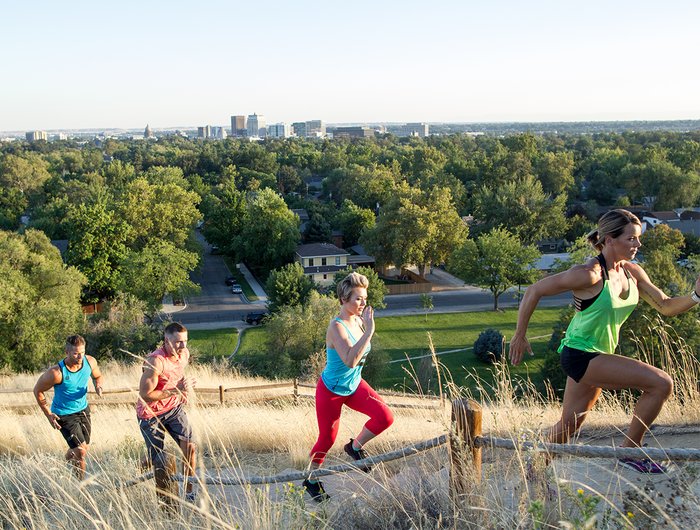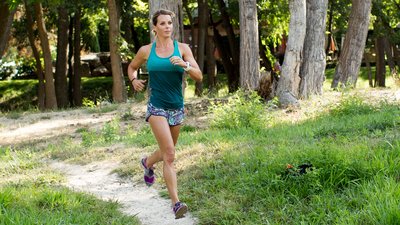When running is the sport you love, it can be easy to slip into a mindset where you don't have time for anything but miles. Got an hour? You run. Tomorrow, probably more of the same. If you have a huge mileage number at the end of your week or race prep, well, that's a sign that you did it right.
Unfortunately, that volume-first mentality is also what leads many runners to get injured—and just as importantly, to stumble through their days feeling overtrained and awful rather than capable and athletic.
No matter how much you love running—or rather, especially if you love running—you need balance in your training! Strength training needs to play a part in your programming, even if it means dialing back the volume elsewhere. Here are the most compelling reasons to prioritize strength training.
1. You'll Get Faster
This can be hard for many people to wrap their head around. After all, if you weight train, you'll inevitably put on epic amounts of bulk and bring your pace to a crawl, right? Wrong!
On the contrary, if you pick up some heavy objects, you'll start picking up the pace as well. Weight training makes your whole body move more efficiently and strengthens connections between your muscles and nervous system, which improves your running economy.[1] That means you can cover more ground with the same amount of energy, giving you a leg up in distance races.
No, this doesn't mean you need to start grinding through epic, heavy single reps like a powerlifter. If you're new to lifting, start with lighter weights and bodyweight moves so you don't get hurt. Save your pride for race day.
2. You'll be more resilient to injury
If all you do is run, some muscles will end up tight, like hip flexors and calves, while others stay weak—especially the core and glutes. That combination is a recipe for pain and injuries.[2]

But if you work strategically in the gym, you can counteract these weaknesses and stay supple, healthy, and pain-free. This translates to more quality running and less time sitting on the couch with bags of frozen corn on your knees.
Classic lifts like squats and deadlifts are great for building strong glutes. And no, you don't have to do them with a barbell to be effective. Goblet squats and dumbbell single-leg deadlifts are both great options for runners.
More isolated glute work like double-leg and single-leg glute bridges are also powerful; not only do they work the glutes, but they also activate the core and give your hip flexors a much-needed stretch.
3. You'll improve your Posture
Ever notice how some distance runners always look like they're crouched and waiting for the starting gun, even when they're just waiting in line at the store? And that's to say nothing of how they look at the finish line.
Spending so much time in the same position—one that shortens your hip flexors and pitches you forward—tends to lead to premature old-guy stoop. By working the muscle groups running neglects, especially the back, shoulders, and yes, the glutes, you can uncurl yourself and start standing tall.
This isn't just more attractive; it improves your running too. Lat pull-downs and pull-ups open your chest, hit the neglected upper back, and put your head on top of your torso where it belongs. A strong core holds you upright, even when you get fatigued, so work those planks. And while strengthening your glutes, give a thought to stretching their antagonist muscles, the hip flexors and quads.
Strengthen the back side, stretch the front side. This is good advice for anyone, but especially runners!

4. You'll become a more informed, educated athlete
Part of running's beauty is that you can just lace up and go. Sure, competitive runners can usually benefit from improving their form, but you don't need to know which muscles, bones, and connective tissues are involved in order to reach the finish line.
But when you start lifting—and especially when you start geeking out on lifting—you get a whole new perspective on your body and how it works. You start to recognize how your muscles power movement, how the parts of your body work as a team, and how you can empower that team to do better work.
This isn't just book learning, either. At some point, you'll completely hammer one muscle group in the gym, like, say, your obliques, then go for a run the next day when you're sore. Suddenly, this previously unnoticed muscle group will be telling you where it is and what it does loud and clear with every step.
The more you understand how everything fits together, the better you'll get at giving your body the training and recovery it needs to perform. Plus, you can impress people at parties with words like semimembranosus and infraspinatus.
5. You'll get more from your offseason
When the weather's good, you run. When the weather's bad, you...don't run. If this is your version of programming, you definitely need to hit the gym! Spending time building strength in the gym can help you maintain your fitness level, keep your weight down, and make it easier to slip back into running when you're ready.
You can also work to stay strong in the gym while you wait out an injury. Seek out a medical professional who can tell you which moves will help—without hurting you further—and learn modifications that won't aggravate your injury. You can switch to seated or lying exercises, rather than standing, to give foot and lower-leg injuries a chance to heal. Or you can put your focus on building up your core if a limb is off-limits.
And always listen to your body. If it hurts, don't do it!
6. It can help you stay motivated
This may sound counterintuitive, but consider the alternative. The "more of the same is always better" approach that is typical for many runners and triathletes often leaves them burned out and dreading their training after high-volume phases.
Stepping off the road, bike, or trail and into the weight room gives you a new obstacle to test yourself against. Yes, it's weird and different. And yes, you'll probably suck at first. But these are good things!

Being in a new environment, around new people, and encountering new challenges will give you a fresh perspective. It might be just what you need to reawaken your competitive urge and put some power in your stride.
Need one more push? Think of all the runners who don't lift. This could very well end up being your secret weapon to be deployed when you need that extra gear.
7. You can be better at life, not just 5K races
Races aren't the only test of performance in life. When it comes time to shovel your driveway, help a buddy move, or carry a sleepy human, nobody wants to feel weak or incapable—especially someone who is undertaking serious athletic training!
Core strength, glute strength, posture, balance, a healthy body composition—these attributes aren't just good for runners, they're good, period. And a relatively simple move like the single-leg deadlift can help develop all of them. The strength it builds can help you navigate rocky, uneven terrain on the trail, and it also might save your bacon when you're walking across an icy parking lot.
The writing's on the wall. Become a stronger runner. You won't regret it.
Shop BCAA Products In Our Store!
References
- Jung, A. P. (2003). The impact of resistance training on distance running performance. Sports Medicine, 33(7), 539-552.
- Verstegen, M., & Williams, P. (2008). Core Performance Endurance: A New Training and Nutrition Program that Revolutionizes Your Workouts. Rodale.

